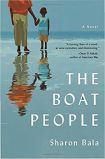The Boat People by Sharon Bala
| The Boat People by Sharon Bala | |
|
| |
| Category: General Fiction | |
| Reviewer: Rebecca Foster | |
| Summary: Based on a real-life refugee crisis that hit Canada in 2009, Bala's debut novel illuminates all sides of the issue by focusing on a father and son who travel from Sri Lanka to Vancouver Island by boat, their lawyers, and the Japanese-Canadian adjudicator who is to decide on their case. The message about the necessity of compassion might not be very subtle, but it's an important one given the plight of refugees around the world today. | |
| Buy? Yes | Borrow? Yes |
| Pages: 338 | Date: January 2018 |
| Publisher: Doubleday Books | |
| External links: Author's website | |
| ISBN: 9780385542296 | |
|
| |
Among the 500 Sri Lankans in a rickety boat making its way to Vancouver Island are Mahindan and his six-year-old son Sellian. When the boat arrives the Canadian authorities take all the passengers into custody, placing the women and children in a separate facility from the men. A gruelling series of hearings will decide on the fate of each individual or family: whether they will be allowed to stay in Canada, or deported back to Sri Lanka. The government fears that up to half of these asylum-seekers may have links to the Tamil Tigers, a terrorist group, so judges are instructed to have a firm hand.
Mahindan is assigned a legal team, one member of whom, Priya Rajakaran, is a second-generation Sri Lankan-Canadian law student completing an internship. Although corporate law is meant to be her speciality, she gets roped into the immigration case because of her background. Alongside Mahindan and Priya, the third main character is Grace Nakamura, a third-generation Japanese-Canadian adjudicator who is to decide on Mahindan's case. Grace has recently been transferred to the Immigration and Refugee Board after years with the transportation department, and is keen to make a good impression by taking a hard line.
Flashbacks and family connections fill in the backstory of all three characters and keep them from becoming simple stereotypes. After his wife Chithra died in childbirth, Mahindan focused on his mechanic business and kept his head down to avoid being conscripted into the Tamil Tigers, but as the country was torn apart by civil war he managed to be drawn into a couple of dodgy schemes that may now threaten his asylum application. Priya learns that her uncle's life back in Sri Lanka was not as straightforward as it seemed, and Grace is reminded by her mother, Kumi, of the mistreatment their Japanese forefathers experienced due to North America's wartime internment practices.
The book's message about the importance of compassion might not be a very subtle one – especially with that historical parallel to Japanese internment – but it's an important one given the plight of refugees around the world today. Even though the events that inspired this novel took place nearly nine years ago, one can recognise much of the rhetoric that still infuses political debates: the necessity of building strong borders, of being tough on terrorism, and of maintaining a national identity. This is in ironic contrast with North America's history of population growth by immigration and a self-chosen reputation for welcoming strangers. 'In immigration law, there can be a gap between policy and practice. And when it comes to refugees, this country has a split personality,' as one of Mahindan's lawyers puts it.
The scenes set in Sri Lanka are particularly vivid. Bala has drawn on her own family's history. Although all of the characters are fictional, she has reproduced some actual words from refugees' anonymous testimony. Mahindan is the most sympathetic of the three main characters, while Priya offers a model for how Tamils might settle into a Western community after a generation has passed. Could Sellian follow in her footsteps? We wonder this along with Mahindan. I appreciated that the novel's ending is inconclusive but still optimistic.
There is always a danger of history repeating itself, but getting to know individual refugees and forming compassionate connections is one key way to replace stereotypes with real knowledge. 'Fresh off the boat' is an insult Kumi used to hear as she walked down the street, and it could be literally applied to Mahindan and his fellow asylum-seekers. But as the epigraph from Martin Luther King, Jr. so perfectly expresses, 'We may have all come on different ships, but we're in the same boat now.'
Further reading suggestions: The Year of the Runaways by Sunjeev Sahota and Kind of Kin by Rilla Askew.
Please share on: ![]() Facebook,
Facebook, ![]() Twitter and
Twitter and
![]() Instagram
Instagram
![]() You can read more book reviews or buy The Boat People by Sharon Bala at Amazon.co.uk Amazon currently charges £2.99 for standard delivery for orders under £20, over which delivery is free.
You can read more book reviews or buy The Boat People by Sharon Bala at Amazon.co.uk Amazon currently charges £2.99 for standard delivery for orders under £20, over which delivery is free.
![]() You can read more book reviews or buy The Boat People by Sharon Bala at Amazon.com.
You can read more book reviews or buy The Boat People by Sharon Bala at Amazon.com.
Comments
Like to comment on this review?
Just send us an email and we'll put the best up on the site.


